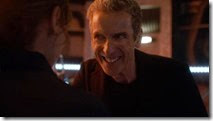 |
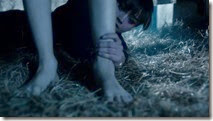 |
 |
“Listen”
That was certainly the most episode of Season 35 so far. You name it, this was more of it, for (mostly) better or worse.
Steven Moffat is many things, among them certainly a very talented writer. Just as certainly he gets Doctor Who in a way Russell T. Davies never did, as amply evidenced by the glorious 50th Anniversary week last year. But he can’t help himself – he can’t help ripping himself off. He can’t help taking his good ideas and beating them into the ground. He can’t help trying to put his stamp on the series’ mythology in a way that can never be unraveled, as often as possible. And he can’t help but be interesting, even when he’s being irritating. Which this season is pretty much all the time.
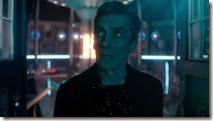 |
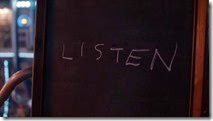 |
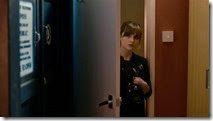 |
I’ll state up front that “Listen” is easily the best episode of the Capaldi era so far, even if that’s a low bar. It’s the first story this season that’s really had me transfixed during its airing, and grinding about what I’ve just watched in its aftermath. The fact that the theme of the invisible companion – the being that’s evolved to be the ultimate hider – is so derivative of earlier Moffat scare stories is obvious, but that’s not a huge problem for me. Fact is Moffat is very good at this sort of story – at picking away at the archetypal fears in our subconscious and giving them form on-screen. “Listen” only tries to be scary some of the time, but when it wants to be it certainly is.
Of much more lasting import are other concerns, firstly Clara’s continued tendency to be a Mary Sue (her head’s gotten so big she needs three mirrors). She’s effectively taken over as the main character, which seems a shame to me when you have an actor as good as Peter Capaldi opposite. Not only is she ordering the Doctor around and showing more acumen in moments of crisis (impossibly so, in fact – but then she is the impossible girl) but she’s starting to literally fill the Doctor’s role now, and with increasing frequency. Once you’ve gone down this road with a character I don’t think there’s any going back, so this is probably fixable only when Jenna Coleman leaves the series, hopefully as rumored after the Christmas special (the best present ever!).
 |
 |
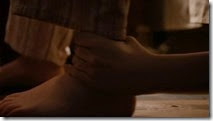 |
Then there’s that ending, which is certainly fascinating. It feels like a classic overreach by Moffat, who just can’t help sticking his hand in the cookie jar even if he knows there’s a Brown Recluse Spider inside. I don’t know that we needed to see the Doctor as a boy – seemingly an orphan – crying in terror as he sleeps in a barn to escape teasing from the other boys. I feel quite certain we didn’t need Clara being made out to be responsible for the man he becomes, which is really taking the Mary Sue thing too far. But now that he’s done it – shown us what Joh Hurt’s War Doctor was so afraid of in that barn – it seems as if Moffat is obliged to go back and fill in the blanks of the Doctor’s past in more detail. As unsettling as the idea is, the prospect of a serial centered on the Doctor’s boyhood has an undeniable appeal.
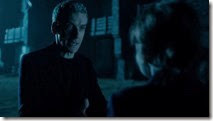 |
 |
 |
As for everything Pink – Danny, Rupert, Orson – clearly this is one of the major MacGuffins of the season, and we know Moff loves him some MacGuffins. It’s obvious with the results of the telepathic link between Clara and the TARDIS that she and Danny have a strong connection. I don’t necessarily take that to mean that the man we met at the end of time is Clara and Danny’s great-grandchild, though that’s the most obvious possibility – Clara and Danny might have ended up as friends, perhaps even jointly traveling with the Doctor. That would certainly seem to be a strong enough link to explain what happened.
To the question of whether there really is something there when we’re alone – who wrote on the chalkboard, who that was under the blanket, who opened the airlock – that’s left intentionally vague. It’s implied that there’s a very basic explanation for the Doctor’s obsession with the theme, but that doesn’t explain away his notion that everyone has the same dream for a reason.
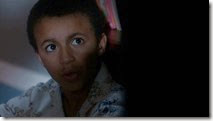 |
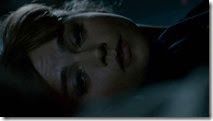 |
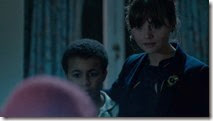 |
One thing more that must be said about “Listen” – give Moffat credit for coming up with turns of phrase that seem destined to become part of the Doctor Who lexicon forever. In the broad sense I very much like the idea of a story exploring the Doctor’s fears, because Lord knows no one has more to be afraid of than he does. “Fear is a superpower” he tells the young Rupert Pink, and it’s a lovely idea, a classically Whovian notion. The Doctor is indeed “the solider so brave he doesn’t need a gun” – but as we all know (because Jon Petwee’s Doctor told us) “Courage isn’t a matter of not being frightened, you know. It’s being afraid but doing what you have to do anyway.” While there are some troubling wobbles along the way, “Listen” shows that Moffat has the ability to crystalize the mythology of Doctor Who in a simple and profound way like few other writers can.
 |
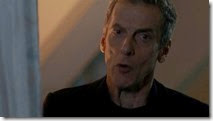 |
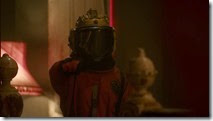 |
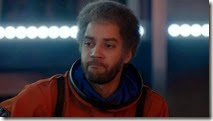 |
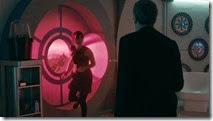 |
 |
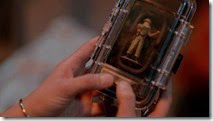 |
 |
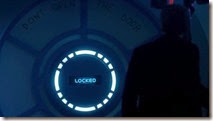 |
 |
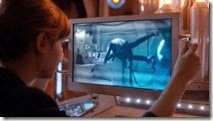 |
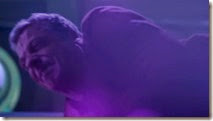 |
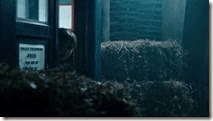 |
 |
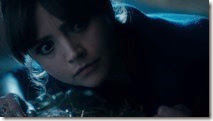 |
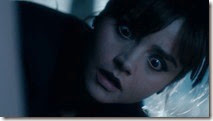 |
 |
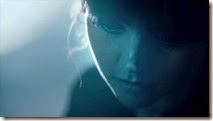 |
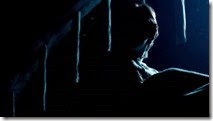 |
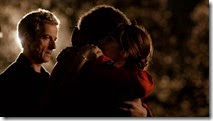 |
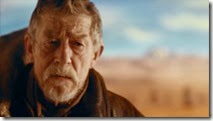 |
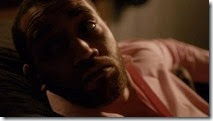 |
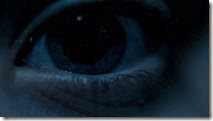 |
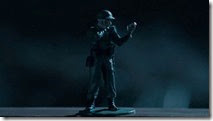 |


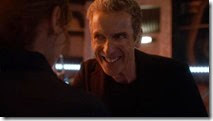
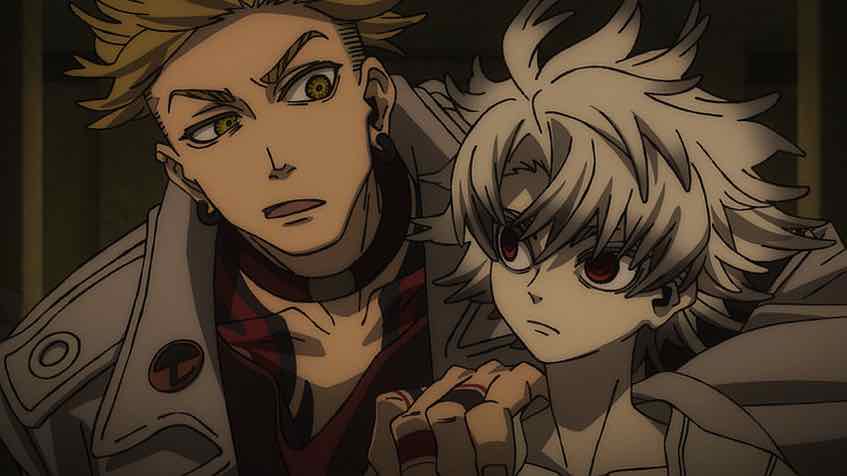

Cybersteel
September 16, 2014 at 9:54 amBut isn't Galifrey stuck in a time lock…? And isn't the reason why the Doctor Hide in the barn because he stared into the Untempered Schism and got scared?
Merry Smithy
September 17, 2014 at 1:13 pmNot anymore, because… Moffat said so.
There were similar complaints made in the past regarding some Matt Smith episodes, but he basically said (and I'm sorry, I can't find the exact quote), we don't know how time travel works.
Moffat has essentially taken it upon himself to steadily twist and rewrite Doctor Who lore.
Kim
September 17, 2014 at 6:07 pm"Moffat has essentially taken it upon himself to steadily twist and rewrite Doctor Who lore."
Pretty much every single producer and show runner has done this in some way. Doctor Who has always been "make it up" as it goes along.
I mean I don't like learning "too much" about the Doctor since I think certain things should remain a mystery. But some of what you are accusing Moffat of is not unique to him at all. And RTD was guilty of it too.
Kim
September 16, 2014 at 10:18 amLoved the episode except Clara being placed in an important moment in the Doctor's past AGAIN. It really is getting rudiculous.
admin
September 16, 2014 at 10:31 amMoffat has a Mary Sue problem generally, but when it's the companion it's a real issue.
Gary Cochran
September 16, 2014 at 3:06 pmBut she is the impossible girl.
sonicsenryaku
September 17, 2014 at 5:53 amsigh….im gonna miss clara when she leaves…i felt like she was really coming into her own
Merry Smithy
September 17, 2014 at 1:17 pmWhile the episode was definitely more enjoyable than what we've seen so far, I really can't stand how Moffat's exploring more of the Doctor's past. I frankly wasn't at all excited about how more and more of the stories revolve around the Doctor's life.
Doctor Who was originally an educational series, and with that, I really enjoyed how most of Eccleston and Tennant's episodes were about the world around them; they explored, encountered, and educated (us) about interesting cultures and things both real and fictional.
I really wish somebody would give Moffat a firm slap upside the head.
There's so much unnecessary reaching for the shock and awe, when all we really need is some intelligence and intrigure.
Merry Smithy
September 17, 2014 at 1:21 pmForgot to add in my best point:
Since DW was educational, I always felt the Doctor should take a teacher style role in the series. While he is most certainly proactive and quite a hero at times, the show should primarily focus on the world around them. That's why I enjoyed Eccleston and Tennant much more.
Making the Doctor the center-point for the plot only restricts the story due to pre-existing canon, this causes the scope of the story to shrink (regardless of whether or not they're saving the universe) and be less rich and interesting than it could be.
Kim
September 17, 2014 at 6:09 pmAlso Doctor Who was originally meant to be educational during the Hartnell era this is why the Doctor traveled with a history and science teacher and there were so many pure historicals. I haven't seen it be much educational since then though when they realized they got the highest ratings with "monster episodes".